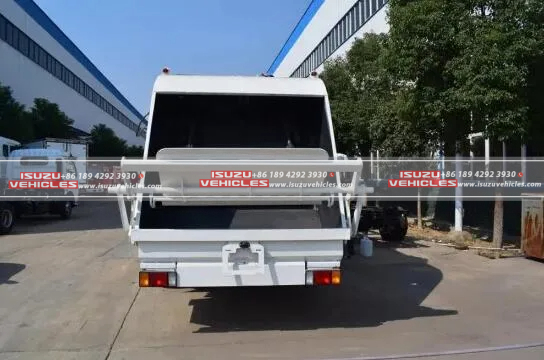As cities worldwide grapple with escalating waste volumes and stringent environmental regulations, the ISUZU garbage truck emerges as a transformative solution, blending operational efficiency with ecological responsibility. Engineered to address the dual challenges of rapid urbanization and climate accountability, ISUZU’s latest innovation is reshaping urban sanitation systems while setting new benchmarks for sustainable industrial design.
1. ISUZU’s Environmental Mandate: Pioneering Cleaner Urban Landscapes
The global waste management crisis demands urgent technological intervention. By 2025, urban centers generate over 2.3 billion metric tons of municipal solid waste annually, with inefficient collection systems contributing to pollution and public health risks. ISUZU’s commitment to sustainability is embodied in its ISUZU Garbage Truck, a vehicle designed not just to collect waste but to redefine the entire lifecycle of urban refuse handling.
Central to this vision is ISUZU’s “Green Logistics 2030” framework, which prioritizes carbon-neutral operations and circular economy principles. The ISUZU Garbage Truck integrates advanced emission control systems, hybrid-electric drivetrains, and AI-driven route optimization software, ensuring minimal environmental impact while maximizing productivity. By aligning engineering prowess with planetary stewardship, ISUZU bridges the gap between industrial utility and ecological preservation.
2. Engineering Excellence: The Anatomy of Efficiency
Electric Powertrains: Reducing Carbon Footprints Without Compromising Power
The ISUZU Garbage Truck features a modular hybrid-electric engine capable of switching between diesel and full-electric modes, slashing CO2 emissions by up to 45% compared to conventional models. This dual-power system is particularly impactful in densely populated cities like Lagos and Jakarta, where idling engines during frequent stops exacerbate air quality issues. The truck’s regenerative braking system further captures kinetic energy, converting it into reusable electricity—a innovation that reduces fuel consumption by 18%.
Smart Route Optimization: Cutting Costs, Saving Time
Equipped with IoT-enabled sensors and machine learning algorithms, the ISUZU Garbage Truck analyzes real-time traffic patterns, waste accumulation hotspots, and weather conditions to generate dynamic collection routes. In trials across Bangkok, this technology reduced collection cycles by 30%, enabling municipalities to reallocate saved funds toward recycling infrastructure. The system’s predictive maintenance alerts also minimize downtime, ensuring 95% operational availability even in harsh climates.
3. Sustainable Technologies Driving Circular Economies
Waste-to-Energy Integration: Turning Trash into a Resource
Beyond collection, the ISUZU Garbage Truck supports circular economy models through onboard waste compaction and sorting mechanisms. Its high-pressure compaction system increases load capacity by 25%, reducing the number of trips required to landfills. In partnership with biogas firms, select models now feature methane capture modules that convert organic waste into clean energy during transit. Pilot programs in Nairobi have demonstrated that a single truck can power 50 households daily using captured biogas—a breakthrough in decentralizing energy grids.
Additionally, the truck’s modular design allows for seamless integration with municipal recycling hubs. Sensors automatically categorize metals, plastics, and compostables, streamlining downstream processing. This closed-loop system not only diverts waste from landfills but also transforms sanitation fleets into active participants in resource recovery.
4. Global Impact: Case Studies from Africa to Southeast Asia
Case Study 1: Revolutionizing Waste Collection in Cape Town
In Cape Town, where aging waste infrastructure struggles to keep pace with population growth, the ISUZU Garbage Truck has reduced illegal dumping incidents by 60% since its 2024 deployment. The city’s adoption of ISUZU’s AI route planner enabled crews to prioritize high-risk areas, cutting response times to spill reports from 72 hours to just 12. Local operators praise the vehicle’s ergonomic cab design and automated lifting mechanisms, which reduce physical strain on workers while improving safety.
Case Study 2: Tackling Marine Plastic Waste in Indonesia
Along Indonesia’s coastline, ISUZU collaborates with coastal communities to intercept plastic waste before it reaches the ocean. Modified ISUZU Garbage Trucks equipped with conveyor belts and floating debris collectors operate in tandem with fishing fleets, recovering over 12 tons of marine plastic monthly. This initiative, funded by ISUZU’s Global Sustainability Fund, underscores the vehicle’s adaptability to diverse environmental challenges.
5. Future Horizons: Expanding the Ecosystem of Clean Mobility
ISUZU’s innovation extends beyond garbage trucks to create a holistic ecosystem for urban cleanliness. The recently launched ISUZU Sweeper Truck, featuring dual-function brushes and waterless dust suppression systems, is redefining street maintenance in arid regions. Meanwhile, the ISUZU Vacuum Truck, with its high-suction debris removal capabilities, is becoming indispensable for disaster-stricken areas needing rapid cleanup.
Looking ahead, ISUZU plans to integrate hydrogen fuel cell technology across its waste management fleet by 2027, aiming for zero-emission operations. Partnerships with smart city developers will also embed these vehicles into IoT-driven urban networks, where waste collection schedules are synchronized with energy grids and public transit. By continuously evolving its technology, ISUZU isn’t just keeping cities clean—it’s paving the way for a smarter, greener urban future.
